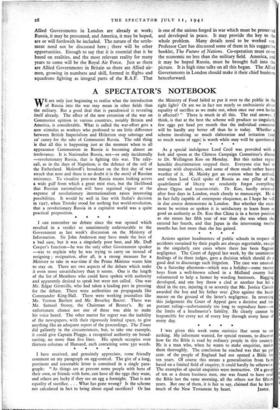A SPECTATOR'S NOTEBOOK
WE are only just beginning to realise what the introduction of Russia into the war may mean in other fields than the military. But a good deal that is paradoxical is revealing itself already. The effect of the new extension of the war on Communist opinion in various countries, notably Britain and America, is considerable. What is called the war-effort gets a new stimulus as workers who professed to see little difference between British Imperialism and Hitlerism stop sabotage and ca' canny for the sake of Communist Russia. The odd thing is that all this is happening just at the moment when to all appearance Communism in Russia is becoming almost an irrelevance. It is Nationalist Russia, not—or only incidentally —revolutionary Russia, that is fighting this war. The rally- call, as in the days of Napoleon, is the defence of the soil of the Fatherland. Molotoff's broadcast on the first day of war struck that note and there is no doubt it is the motif of Russian resistance. To visualise post-war Russia means looking across a wide gulf from which a great mist rises, but the likelihood that Russian nationalism will have regained vigour at the expense of revolutionary internationalism raises interesting possibilities. It would be well in line with Stalin's decision in 1927, when Trotsky stood for nothing but world-revolution, that a revolutionary Russia in a capitalist world was a quite practical proposition.


























 Previous page
Previous page